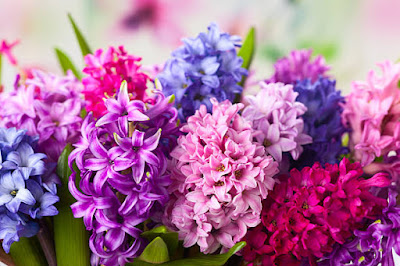Every year around Easter time my sister leaves a few potted hyacinths for me. I can tell they’ve arrived as soon as I open the door. The sweet fragrance and wondrous colors make me smile. After they flower I plant the bulbs in the ground and each spring the hyacinths reappear with new life. They do not know death.
These days it seems as if we are in the cold dark season of winter rather than the transformative joy of spring. Flowers and Easter hope offer relief but they cannot actually soothe the real pains of humanity.
In the Acts of the Apostles (5:27-32, 40b-41), the passage assigned for today, the early disciples were thrown in jail and cast out of the region for preaching the values taught by Jesus.
No matter how hard we try to address the gloom of the night we too are up against real and symbolic voices telling us to “stop teaching in the name of Jesus.”
The biblical texts in the Easter season comprise a stimulus package for us. Buoyed up by the testimonies of the post-resurrection followers of Jesus we search for spiritual and intellectual enlightenment to help us move forward to care for one another with confidence and the strength of our common bonds.
After Jesus of Nazareth died on the cross the disciples could not get him out of their minds. They actually imagined he was still with them. The gospel stories say that he appeared three times after his crucifixion. Like hyacinths rising from the cold ground death could not contain the Spirit of the Human One also believed to be divine. Christian doctrine says we have been rescued by the life, suffering and death of Jesus. Given this belief, as the psalm for today suggests (v. 3:2,4,5-6, 1-13), how do we now turn mourning into dancing? Or in the spirit of the gospel (John 21:1-9) do we dare, once again, to “launch out into the deep sea” to reel in fresh nourishment?
Stirring up both fear and hope the apocalyptic Book of Revelation (5:11-14) reminds us that a person named John saw and heard the voices of angels. Scholar David E. Aune commented that Jewish apocalypses “often reflect a sharp distinction between the present evil age and the imminent future age of blessing.” It is a hope-filled literary message that requires action.
We are the holy spirits who are to give voice to justice and peace today. Our task is to distribute blessings amidst the imperfections of life on earth. Like the bouquet of hyacinths we can temper bitterness with sweetness.
We gather for liturgy to sing hymns, say prayers, and to be in communion with Christ and one another for a common cause. Together we take our Christian message to the streets, to join with others from different faiths, or no faith at all, to deliver hope and promise.
The familiar gospel of John 21:1-19 is not asking us to convert people to the message of Jesus. It is a summons to carry on the mission that Jesus could not bring to completion himself, a ministry of kindness and compassion toward all peoples.
Casting our nets into the sea of humankind is a metaphorical strategy about evangelization not indoctrination. By example we can touch those who are victims of injustice as well as those who inflict the pain. We are in a partnership with God and one another.
We draw insights for our spiritual and intellectual relationships from the blessings we get by living a sacramental life. These sacred experiences embolden our spirits. They rehearse us for living in ways that make others around us ask some serious questions about reconciling differences, obstructing oligarchies, ending crime, feeding multitudes, and respecting diverse identities.
The hyacinth is noteworthy among the many perennial flowers that blossom at this time of year. In one Greek mythology the flower is associated with devotion beyond death. It can remind us of our loyalty to Christian principles. And, because of its colors and fragrance, the hyacinth is also linked to joy, playfulness, and fresh starts. It is a perfect flower for Eastertide. Thanks again, Sis!
+++


No comments:
Post a Comment